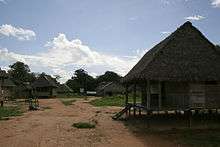Ese Ejja
 Ese Ejja Village. Tambopata Rezerve, Peru | |
| Total population | |
|---|---|
| (1,770 (2000)[1]) | |
| Regions with significant populations | |
|
| |
| Languages | |
| Ese Ejja language, Spanish | |
| Religion | |
| Christianity, traditional tribal religion |
The Ese Ejja are an indigenous people of Bolivia and Peru, in the southwestern Amazon basin. 1,300 Ese Ejja live in Bolivia, in the Pando and Beni Departments,[2] in the foothills along the Beni and the Madre de Dios Rivers. In Peru, they live along the Tambopata and Heath Rivers, near Puerto Maldonado.[1]
Name
Their name derives from their autonym, Ece'je, which means "people."[2] They are also known as the Chama, Ese Eja, Ese Exa, Ese’ejja, Huarayo, Tambopata-Guarayo, or Tiatinagua people.[1]
Language
The Ese Ejja language is a Tacanan language, spoken by all ages, and written in the Latin script. A dictionary has been produced for the language.[1]
Subsistence
Ese Ejja people are traditionally hunter-gathers, farmers, rangers, and fishermen.[1]
Notes
- 1 2 3 4 5 6 "Ese Ejja." Ethnologue. Retrieved 17 Feb 2012.
- 1 2 "Huarayo - Orientation." Countries and Their Cultures. Retrieved 17 Feb 2012.
External links
- Ese Ejja artwork, National Museum of the American Indian
This article is issued from
Wikipedia.
The text is licensed under Creative Commons - Attribution - Sharealike.
Additional terms may apply for the media files.